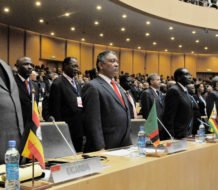By Ed Stoddard
JOHANNESBURG (Reuters) – South African mining firm Sibanye Gold has fired around 1,500 workers taking part in a wildcat strike at its Cooke mine, it said on Thursday, prompting an angry reaction from the biggest gold miners’ union.
Workers at the mine downed tools over a week ago, angered by a company drive to root out illegal miners which has included the arrest of employees for collusion and taking food down to the illegal miners working underground.
Illegal gold mining has plagued South Africa for decades, with bullion pilfered from both disused and operating mines, and Sibanye has vowed it will clear all illegal miners from its shafts by January 2018.
The Cooke mine employs close to 4,000 underground miners and Sibanye said the sacked workers could appeal their dismissals.
The National Union of Mineworkers (NUM), the largest union in the gold mining industry, said earlier that nearly 2,000 miners were fired, including 1,100 of its members, who it said had been “wrongly dismissed.”
Sibanye said 793 NUM members had been dismissed.
NUM said they had been forced to take part in the strike in the face of coercion and intimidation from rival union the Association of Mineworkers and Construction Union (AMCU). Last week 16 NUM members at Cooke were assaulted.
AMCU officials could not immediately be reached for comment.
Located about 60 kms(35 miles) south-west of Johannesburg, the Cooke mine produces about 181,700 ounces of gold a year and brings in around 377 million rand ($29 million) in operating profit, or just over 6 percent of the group’s total.
Over 240 illegal miners have been arrested since the stoppage began. They have been forced to come to the surface because of the strike, which has emptied the shafts of employees, thereby starving them of their sources of food and water underground – an unintended consequence of the strike.
(Writing by and additional reporting by Tiisetso Motsoeneng; Editing by Mark Potter)




